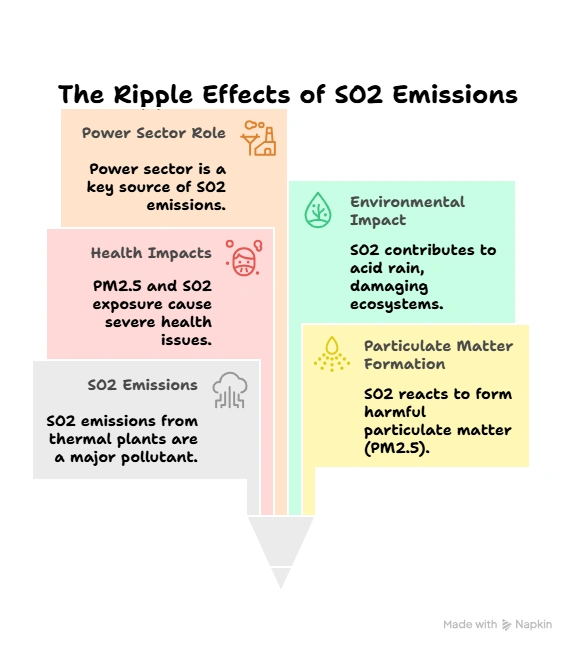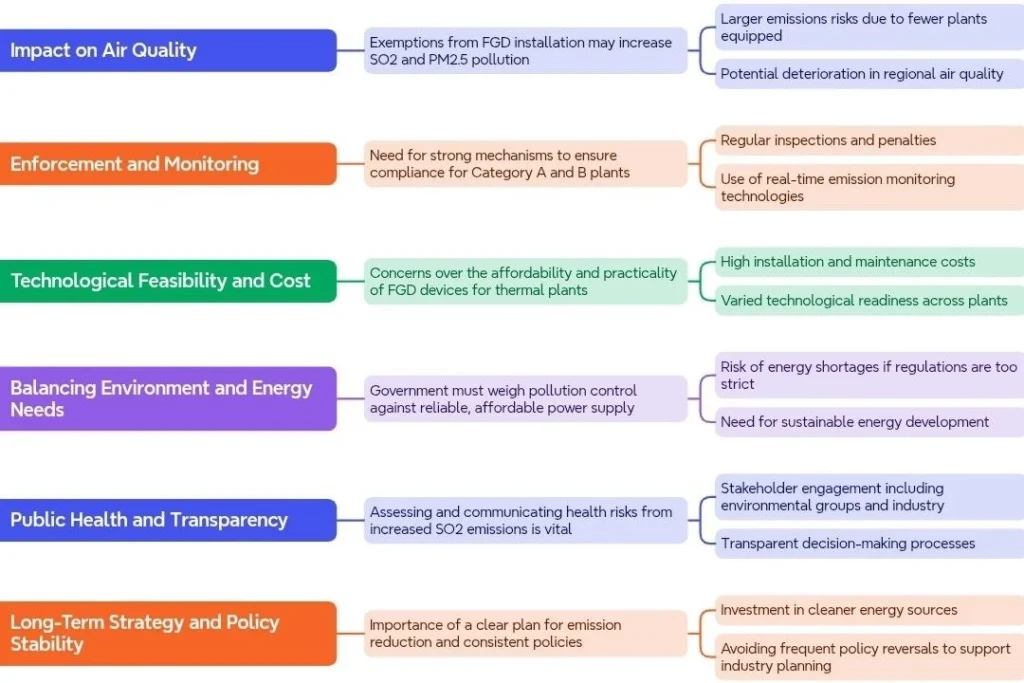Paper: GS – III, Subject: Environment and Ecology, Topic: Pollution, Issue: FGD Device Installation Policy.
Context:
The recent decision by the Indian Environment Ministry to exempt a majority of coal-based thermal plants from installing Flue Gas Desulphurization (FGD) devices, which are designed to remove sulphur dioxide (SO2) emissions.
Key Takeaways:
| Flue Gas Desulphurisation: A high-powered committee led by Principal Scientific Advisor Ajay Sood has recommended scrapping the decade-old policy requiring Flue Gas Desulphurisation (FGD) units in all coal-fired thermal power plants. The panel concluded that FGDs may no longer be necessary, marking a potential shift in India’s pollution control strategy. The Environment Ministry is currently reviewing the committee’s recommendation. A final decision will be made by the Power and Environment Ministries. Flue Gas Desulphurisation (FGD) FGD is a technology used to remove sulphur dioxide (SO₂) from the exhaust (flue) gases emitted by coal-fired power plants, industrial boilers, and other combustion sources. |
Government Efforts to Address SO2 Emissions:
- 2015 Emission Norms: In 2015, the Environment Ministry introduced emission norms for controlling SO2 and other harmful substances from coal-based thermal plants, requiring the installation of FGD devices by December 2017.
- Repeated Extensions: However, the deadline was extended multiple times at the request of thermal plants, citing the high cost of FGD installation, potential disruption of power supply due to shutdowns, and the possibility of increased electricity bills.
- 2021 Amendment and Categorization: To address these concerns, the Centre amended the emission norms in 2021, categorizing 596 coal-based thermal plant units into three groups.

Proposed Plant Classification and Compliance:
- The committee recommends a tiered approach:
- Category A: TPPs within 10 km of NCR or million-plus cities (66 plants) must install FGDs; only 14 have done so.
- Currently, all these plants are required to comply by 2027.
- Category B: Plants near critically polluted or non-attainment cities (72 plants) may get case-by-case exemptions. These plants currently have a deadline of 2028.
- Category C: The remaining 462 plants should be completely exempted. These plants were given a 2029 deadline.
- The committee has now recommended that Category C plants be exempted completely, along with some units in Categories A and B which were set up at least 20 years ago.
- Distribution of Plants: Approximately 78% of the plants were placed in Category C, 11% in Category A, and the rest in Category B.
Challenges in FGD Device Installation Policy:

Conclusion:
- The decision to exempt a majority of coal-based thermal plants from installing FGD devices raises concerns about air quality and public health.
- While the government cites studies suggesting FGDs are unnecessary for all plants, the potential impact on SO2 emissions and PM2.5 pollution needs to be carefully considered.
- Effective enforcement, transparent decision-making, and a long-term strategy for reducing emissions are crucial to mitigating the environmental and health risks associated with coal-based power generation.
La Excellence IAS Academy, the best IAS coaching in Hyderabad, known for delivering quality content and conceptual clarity for UPSC 2025 preparation.
FOLLOW US ON:
◉ YouTube : https://www.youtube.com/@CivilsPrepTeam
◉ Facebook: https://www.facebook.com/LaExcellenceIAS
◉ Instagram: https://www.instagram.com/laexcellenceiasacademy/
GET IN TOUCH:
Contact us at info@laex.in, https://laex.in/contact-us/
or Call us @ +91 9052 29 2929, +91 9052 99 2929, +91 9154 24 2140
OUR BRANCHES:
Head Office: H No: 1-10-225A, Beside AEVA Fertility Center, Ashok Nagar Extension, VV Giri Nagar, Ashok Nagar, Hyderabad, 500020
Madhapur: Flat no: 301, survey no 58-60, Guttala begumpet Madhapur metro pillar: 1524, Rangareddy Hyderabad, Telangana 500081
Bangalore: Plot No: 99, 2nd floor, 80 Feet Road, Beside Poorvika Mobiles, Chandra Layout, Attiguppe, Near Vijaya Nagara, Bengaluru, 560040
